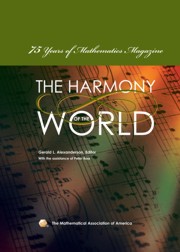Book contents
- Frontmatter
- Introduction
- Contents
- A Brief History of Mathematics Magazine
- Part I The First Fifteen Years
- Part II The 1940s
- Part III The 1950s
- The Harmony of the World
- What Mathematics Has Meant to Me
- Mathematics and Mathematicians from Abel to Zermelo
- Inequalities
- A Number System with an Irrational Base
- Part IV The 1960s
- Part V The 1970s
- Part VI The 1980s
- Briefly Noted
- The Problem Section
- Index
- About the Editors
A Number System with an Irrational Base
from Part III - The 1950s
- Frontmatter
- Introduction
- Contents
- A Brief History of Mathematics Magazine
- Part I The First Fifteen Years
- Part II The 1940s
- Part III The 1950s
- The Harmony of the World
- What Mathematics Has Meant to Me
- Mathematics and Mathematicians from Abel to Zermelo
- Inequalities
- A Number System with an Irrational Base
- Part IV The 1960s
- Part V The 1970s
- Part VI The 1980s
- Briefly Noted
- The Problem Section
- Index
- About the Editors
Summary
Editors' Note: This article was written by the author when he was a 12-year old student at Junior High School 246 in Brooklyn, New York. Here he explores using the golden mean, which he calls τ, more commonly now called ϕ, as the base of a number system. Bergman later went on to get a PhD at Harvard under the direction of John Tate and has had a distinguished career as a mathematician at the University of California, Berkeley. As a result of this article, however, he was interviewed by Mike Wallace for the New York Post in 1958, before Wallace's name became synonymous with CBS's 60 Minutes. When Wallace asked this “tall, gawky, talkative” boy genius, by that time 14 and with an IQ of 205, “George, when you wake up in the morning, what's the first thing you think about? Mathematics?”. Young George answered, “Oh, don't be silly. I think about breakfast.”
Bergman's work here led to an exercise in Donald Knuth's The Art of Computer Programming, vol. 1, 2nd ed., 1973, p. 85, #35, that investigates representations of 1 in the ϕ number system. As noted by Arthur Benjamin in his comments on this article in the Mathematics Magazine index online, http://www.math.hmc.edu/journalsearch/, one of the basic results concerning this curious system is that every positive integer has a finite expansion.
- Type
- Chapter
- Information
- Harmony of the World75 Years of Mathematics Magazine, pp. 99 - 106Publisher: Mathematical Association of AmericaPrint publication year: 2007
- 1
- Cited by

